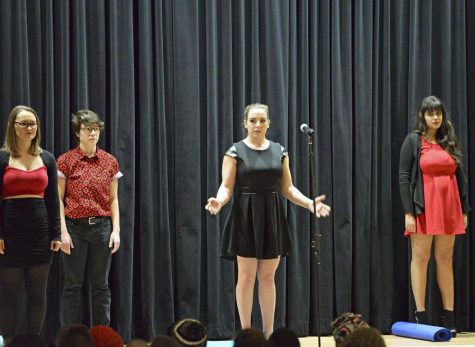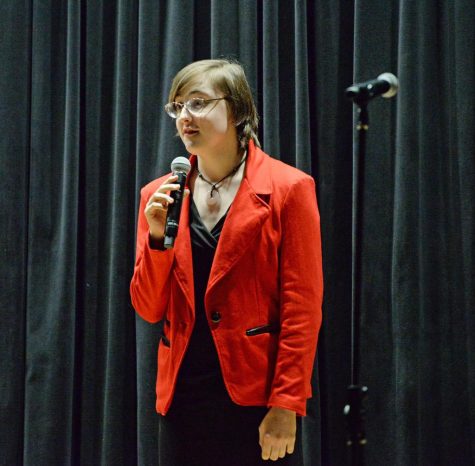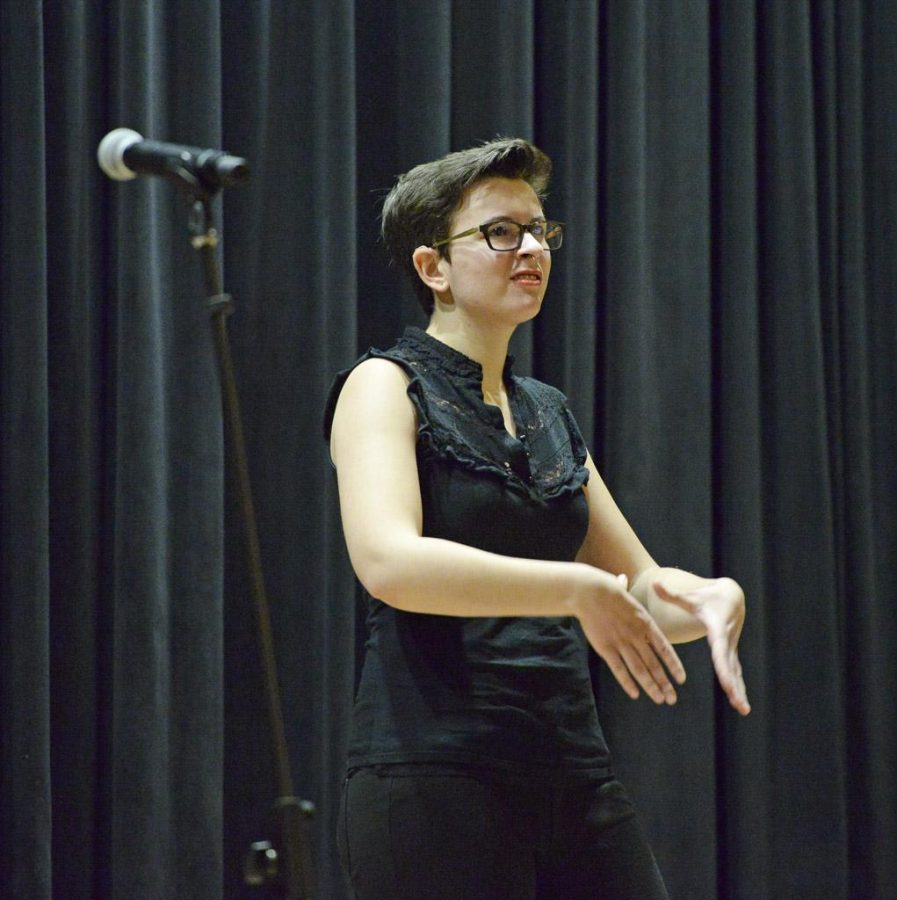In its 12th year, Pitt’s version of “The Vagina Monologues” went silent for the deaf and partially deaf.
About 200 people gathered in the William Pitt Union at 7 p.m. Saturday to watch Pitt’s Campus Women’s Organization’s annual performance of “The Vagina Monologues” — an episodic collection of 18 monologues about gender, sexuality and the shared experiences of women. CWO is donating all proceeds from the show, which was free for Pitt students but $5 for non-students, to New Voices Pittsburgh, an organization that defends the reproductive rights of women and girls of color.
Although American Sign Language translators have interpreted the play in the past, this year’s production featured the first monologue performed solely in ASL. The show had four performances this weekend, starting on Thursday night.
According to Abby Meinen, the theater producer and a junior studying English, the idea came from Sandra Saba, the ASL director. The monologue is meant to pay tribute to a group of people who often have to deal with inaccessible productions because of a lack of ASL translators, Meinen said.
“The past few years it’s been signed. It’s tough because it’s a huge undertaking in a script to tell so many stories in so many different ways with many people who have different relationships with femininity and their vaginas,” Meinen said.
Three ASL translators filed onto stage to perform the last monologue of the night, “My Revolution Begins in the Body.” Using feet stomping, facial expressions and sign language, three performers told the story of a revolution of acknowledging that how one treats the natural world ties into to how one treats themselves.
Following the ASL monologue, English speaking performers took the stage to tell the same story in spoken words. The entire cast had remained onstage for the duration of the play, sitting in chairs in the background.
To Meinen, the monologues are about people feeling loved in a safe space and having the freedom to be authentic.

“I would say that above everything ‘The Vagina Monologues’ is a show about being proud of yourself and being proud of your body and of your story. It’s a coming together of many different people,” Meinen said.
According to The World Federation of the Deaf, the Deaf community is often left out when there isn’t a bridge connecting them and those who speak English.
Meinen hoped the ASL translators would fill the gap, allowing for more inclusion as an audience, but also open the eyes of non-ASL speakers.
For some audience members, such as Kaitlynn Grimes, a former Pitt student who left as a sophomore, this play was their first experience with ASL performers. She was moved by the interpreters whose gazes were fixed to the signers, focusing both on their hands and their expressive faces.
“I’ve never seen anyone sign during a play before, it’s cool to see how it matches the emotions of the speaking performers,” Grimes said.
“The Vagina Monologues” started in 1996 when Eve Ensler, an American playwright, feminist and activist, compiled monologues from New York City.
Each year, V-Day, an organization working to end violence against women and girls globally, picks a few monologues from Ensler’s compilation. V-Day sends the new manuscript to schools and community organizations that perform the play.
In sign language or spoken aloud, Grimes felt the production was “heart wrenching” and she commented on how shocking it can be that the monologues are all true accounts.
“It was something that everybody should come see,” Grimes said. “It breaks down the taboos about the vagina.”
CWO started rehearsing during the first week of the semester. Since then, the cast and crew met every Friday night for 4 hours to practice the play. At Pitt, more than 50 women participated in this year’s production.
Although CWO worked to make the show accessible for deaf audience members, director Maddy Barber said the play could still be excluding the experience of people in the transgender, pansexual and asexual community.

“We need to start shifting the focus on marginalized groups,” Barber said. “We had this dilemma since we started casting, cisgendered men are not allowed to be in ‘The Vagina Monologues,’ trans men and women are because they either have vaginas or identify as women. It is tricky.”
The CWO is looking for ways to put on supplementary productions and events that highlight other marginalized groups. Barber said ey hopes to bring future productions to Pitt that can touch on other important issues.
Although the show is comprised only of monologues, Meinen hopes it will spark a conversation about gender and sexuality that will allow people to be open minded and proud of their bodies, minds and experiences.
“It’s my hope that people walk away finding something in the show that they want to say more on. They say it and then it opens up a space where people can share their stories,” Meinen said. “We put this show on as an invitation, not as the end of what we have to say about these topics.”
Correction: A previous version of this story misgendered Madeline Barber and referred to em with incorrect pronouns. The corrected version reflects Barber’s preferred pronouns, “ey,” “em” and “eir.”



